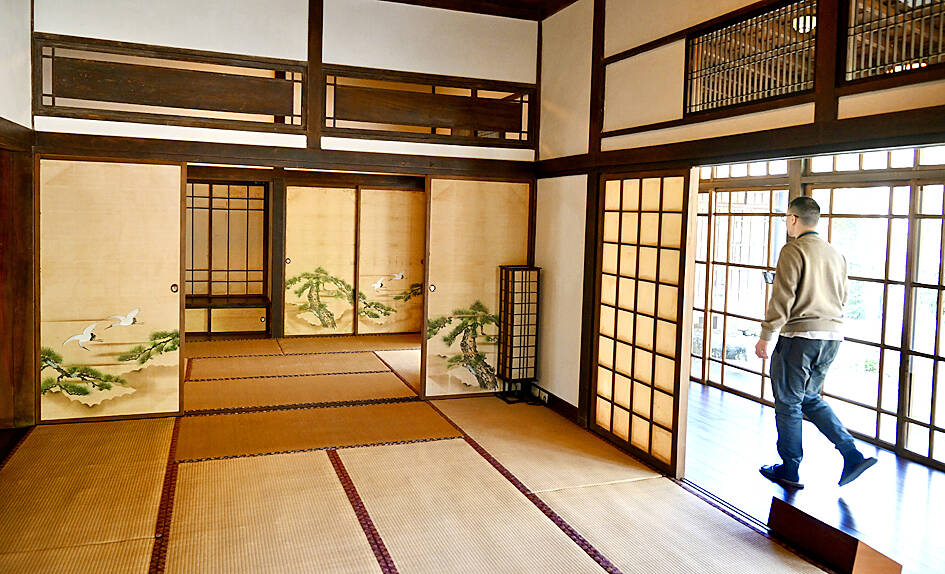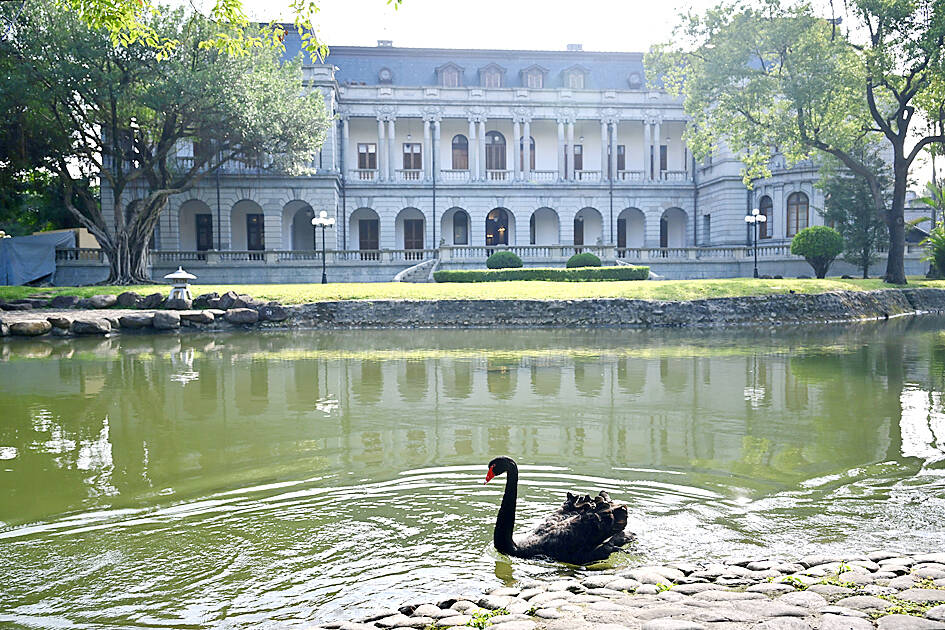Standing proudly on Ketagalan Boulevard near the Presidential Office Building is the Taipei Guest House, whose grandiose halls have for decades housed foreign dignitaries amongst European finery. However, it was only recently that reporters were granted a peek into the Japanese-style lodgings tucked away on its grounds.
Construction of the building was completed in 1901 as a residence for Taiwan’s governors-general during the Japanese colonial era. During that time, the mansion was used to welcome the Japanese imperial family, as well as foreign dignitaries and other top colonial officials.
With the arrival of the Chinese nationalists in 1946, it was renamed the Taipei Guest House while keeping its function as a reception space. More than a century later, not much has changed.

Photo: Lo Pei-de, Taipei Times
In 1998, the building was designated a national historical structure managed by the Ministry of Foreign Affairs by order of the Presidential Office.
The mansion was originally built in the Renaissance Revival style, then took on a more Baroque flair following renovations in 1913, ministry Department of General Affairs Director-General Bruce Hung (洪振榮) said on Jan. 30.
Although it has undergone numerous renovations over the years, the building has not changed aesthetically from the Japanese era, he said.

Photo: Lo Pei-de, Taipei Times
The western wing of the European-style mansion — which now serves as a reception area for foreign guests — was the office of the governor-general, while the eastern wing housed the main banquet and ceremonial halls, he said.
GREEN HIDEAWAY
The Taipei Guest House’s grounds have 720 trees of 74 different species, including 25 that are considered veteran trees. One of them, a tea tree beside the Heart Pond, was planted by Prince Chichibu during his visit to Taiwan in 1925.
Although rat traps are scattered around the grounds, Hung said that there is no infestation at the Guest House. However, the carefully maintained grounds do attract squirrels that might damage the bark, so staff use the traps to capture and move them.
Aside from the unwelcome squirrels, the pond is also home to a family of black swans that are now in their third generation.
However, the swans and Baroque halls were not the focus at a recent media open house.
Reporters instead were there for a glimpse of the Japanese-style bungalow, which is rarely open for viewing.
Appearing quaint next to its opulent neighbor, the bungalow is made entirely of Taiwan cypress, which lends its distinctive scent to its rooms, even to this day.
It used to serve as the living quarters of the governor-general, connected to the mansion by a wooden pathway. It is easy to imagine the colonial official sitting on the veranda, enjoying a panoramic view of the garden while listening to music from a nearby hall.
UNIQUE DESIGN
There are three unique design concepts used in the bungalow, Hung said.
First, the wooden doors do not have grooves or handles, but are opened automatically by gently pulling the center plank to the right, showcasing the ingenuity of Japanese craftspeople, he said.
Next, the tatami mats are arranged in a way to reflect its use as a living space, Hung said.
Finally, there is a special wooden shelf in the toilet designed to accommodate the many layers of a traditional kimono, he added.
One other design quirk can be found on the second story of the mansion. To accommodate visiting Japanese royals, every room has a fireplace.
GUIDED TOURS
The Taipei Guest House is open to the public once a month. Guided tours of the first and second floors of the mansion as well as the grounds are available.

Beijing could eventually see a full amphibious invasion of Taiwan as the only "prudent" way to bring about unification, the US Department of Defense said in a newly released annual report to Congress. The Pentagon's "Annual Report to Congress: Military and Security Developments Involving the People's Republic of China 2025," was in many ways similar to last year’s report but reorganized the analysis of the options China has to take over Taiwan. Generally, according to the report, Chinese leaders view the People's Liberation Army's (PLA) capabilities for a Taiwan campaign as improving, but they remain uncertain about its readiness to successfully seize

Taiwan is getting a day off on Christmas for the first time in 25 years. The change comes after opposition parties passed a law earlier this year to add or restore five public holidays, including Constitution Day, which falls on today, Dec. 25. The day marks the 1947 adoption of the constitution of the Republic of China, as the government in Taipei is formally known. Back then the Chinese Nationalist Party (KMT) governed China from Nanjing. When the KMT, now an opposition party in Taiwan, passed the legislation on holidays, it said that they would help “commemorate the history of national development.” That

Taiwan has overtaken South Korea this year in per capita income for the first time in 23 years, IMF data showed. Per capita income is a nation’s GDP divided by the total population, used to compare average wealth levels across countries. Taiwan also beat Japan this year on per capita income, after surpassing it for the first time last year, US magazine Newsweek reported yesterday. Across Asia, Taiwan ranked fourth for per capita income at US$37,827 this year due to sustained economic growth, the report said. In the top three spots were Singapore, Macau and Hong Kong, it said. South

Snow fell on Yushan (Jade Mountain, 玉山) yesterday morning as a continental cold air mass sent temperatures below freezing on Taiwan’s tallest peak, the Central Weather Administration (CWA) said. Snowflakes were seen on Yushan’s north peak from 6:28am to 6:38am, but they did not fully cover the ground and no accumulation was recorded, the CWA said. As of 7:42am, the lowest temperature recorded across Taiwan was minus-5.5°C at Yushan’s Fengkou observatory and minus-4.7°C at the Yushan observatory, CWA data showed. On Hehuanshan (合歡山) in Nantou County, a low of 1.3°C was recorded at 6:39pm, when ice pellets fell at Songsyue Lodge (松雪樓), a